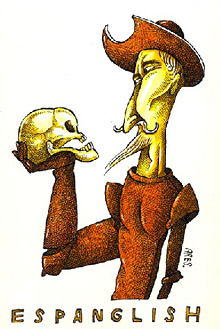Live in Mexico Without Spanish?
 Jim Scherrer - PVNN Jim Scherrer - PVNN


| | (Arístides Hernández Ares) |
¿Donde esta el baño? ¿Como esta usted? That pretty well sums up two years of high school Spanish taken as a college prep course almost 50 years ago! Of course, why would anyone ever need to know Spanish having never met a Mexican, let alone thought about going to Mexico? My, how times have changed!

After living in Houston for 25 years, we discovered that Mexico was only two hours away and that it had some very intriguing qualities to offer. In 1984 we bought a condo in Mismaloya, south of Puerto Vallarta, and made semi-annual visits to Vallarta for 13 years before buying a villa in the foothills of the Sierra Madres, overlooking Banderas Bay and El Centro, the downtown area of PV.

When we moved to Puerto Vallarta, Mexico, known as PV or Vallarta by the locals, ten years ago, our Spanish vocabulary consisted of about five words. Fortunately, a few taxi drivers, most restaurant waiters, and some caddies spoke, or at least understood, a little English.

In order to survive here, it was imperative to understand and speak some degree of Spanish. During our first month in Vallarta, we purchased text books, manuals, dictionaries, and hired a tutor to come to our villa twice a week.

We worked diligently for almost six months, learning Spanish words, paraphrases, tenses, etc. so that we would have a chance of communicating with the locals. To assist our learning process, we watched our Mexican TV which had about five channels; CNN, Mexican shows aimed at sixth graders, and American movies with Spanish subtitles.

We would then turn off the volume and try to understand the movies by reading the subtitles. Not much fun, but the price you had to pay in order to live in Paradise where the average daily temperature during the “high season” of November through May is 73°F with virtually no chance of rain!

We spent that first summer back in the States and upon returning to PV, we got lazy and discontinued our studies. Satellite TV became available in Vallarta and we no longer had the five Mexican channels, but instead had 350 channels from the US.

Fortunately for us, the tourism boom in Vallarta was just beginning to occur ten years ago. During the past ten years, there have been thousands of new houses and tens of thousands of new condos, new hospitals, a new University of Guadalajara campus, new airport, new maritime terminal, etc. built in Vallarta.

As tourism increased, so did the requirement for speaking English by the locals. If they could understand and speak English, they could obtain the higher paying jobs where interaction with tourists is a routine occurrence. Jobs such as waiting tables, caddying, taxi driving, police department, clerking at front desks in hotels, offices, hospitals, airport, etc. and management positions in stores and other businesses could pay three times as much as construction work, daily labor, cleaning, etc. where there is no requirement for English speaking skills.

The difference in wages was so obvious and substantial that during the past ten years, most all of the younger generation of people in Vallarta are taking English classes in school and understand and speak basic English. Even those that haven’t had a day of classroom English have a good understanding of “Espanglish” and we therefore have absolutely no problem communicating with anyone in Vallarta.

Virtually all educated Mexicans in PV such as doctors, lawyers, engineers, architects, bankers, nurses, teachers, etc. are fluent in English. In fact, the majority of these people seem to prefer speaking English with Americans and Canadians.

Typical music in restaurants, bars, hotels, and even dental offices are the popular American songs. American magazines, newspapers, and books are available throughout the city, whereas ten years ago they were virtually non-existent.

In summarizing, having knowledge of Spanish is no longer a prerequisite for visiting or retiring in Vallarta. The majority of the retirees that live in PV have little Spanish speaking ability and get along just fine. Most all tourists by plane or cruise ship have no knowledge of Spanish and they too have no communication problems.

Obviously, Vallarta is not typical of Mexico, however for those considering a trip to or retirement in Vallarta with no Spanish speaking ability, should not be concerned about a language barrier here. At the rate things are changing in PV, who knows, English could become its primary language in another generation!
 The founder of Puerto Vallarta Real Estate Buyers' Agents (PVREBA), Jim Scherrer is a retired entrepreneur who has owned property in Puerto Vallarta for 24 years. Utilizing his experience and extensive knowledge of the area, Jim has written a series of informative articles about travel to and retirement in Puerto Vallarta, which you can read on his website at PVREBA.com. The founder of Puerto Vallarta Real Estate Buyers' Agents (PVREBA), Jim Scherrer is a retired entrepreneur who has owned property in Puerto Vallarta for 24 years. Utilizing his experience and extensive knowledge of the area, Jim has written a series of informative articles about travel to and retirement in Puerto Vallarta, which you can read on his website at PVREBA.com.

Click HERE for more articles by Jim Scherrer |



